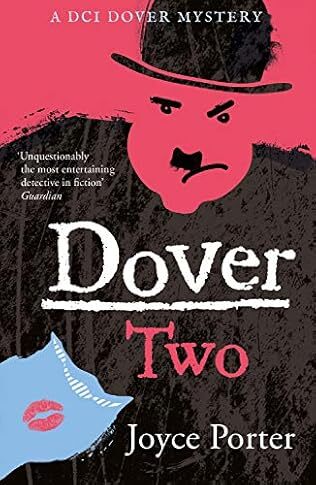Dover Two

A review of Dover Two by Joyce Porter – 250703
Perhaps he captures the zeitgeist perfectly. You know he is a despicable character, obnoxious, lazy, quick to claim the successes of others, rude, with a violent temper and only a passing acquaintance with the protocols of police interrogation, but the more you get to know him, the more fascinating Detective Chief Inspector Wilfred Dover becomes. It is astonishing how a prolonged exposure to the grotesque somehow normalizes it.
Following on from Joyce Porter’s Dover One, Dover Two, originally published in 1965, sees the unlikely duo of Dover and the long suffering DS MacGregor sent to Curdley in the north of England to investigate what the press dub the Sleeping Beauty case. Isobel Slatcher was shot in the head twice as she was leaving the vicarage after her usual Saturday evening meeting with the vicar, Mr Bonnington. Although she was not killed, she was left in a vegetative state and some eight or so months later she was found dead in her hospital bed, having been suffocated with a pillow.
Isobel’s boyfriend, Rex Purseglove, serving as an officer of the RAF away from Curdley, curiously was on the scene at both the time of Isabel’s initial attack and her subsequent murder. Her considerably older sister, Violet, is fiercely protective of her sister, as the story progresses we find out more about their relationship, and frustrated that the police have not brought the assailant to justice, persuades the local newspaper to print a story suggesting that Isabel was about to make a miracle recovery in the hope of spurring the attacker to reveal themselves by trying to finish the job off before Isabel can tell what she knows to the police.
Curdley is a town divided along sectarian lines, the police, except for the lower ranks, being Catholic, while the Slatchers are passionate if not maniacal Protestants and are only too ready to ascribe the police’s supposed inefficiency to their religious differences. Prior to the shooting of Isabel a Protestant meeting was raided by a mob of Catholics and a luger, which was used to shoot Isabel, was lost in the melee.
A constant theme of the book is the case of Bigamous Bertie, a notorious polygamist who also murdered some of his wives, who was recently hung after been brought to justice by one of Dover’s colleagues, whom the press, much to his chagrin, dub Super Percy. Super Percy’s rise to fame is not just a thorn in Dover’s side, as there is a connection between the polygamist and the case which he is investigating which only becomes apparent as the story unfolds.
Despite there being very few suspects for the original assault on Isabel, the escape route for the assailant being effectively blocked off at one end by Rex Purseglove and the other by the fish and chip shop owner, Alfred Dibbs, Dover, in his inimitable fashion, manages to charge in and recklessly accuse the wrong person of attempted murder not once, not twice but three times. His third error, though, does lead to the real culprit revealing their identity, which he has the audacity to claim as the result of his subtle ruse.
Dover, though, is astute enough when overhearing a child recite a snatch from The Owl and the Pussycat to release why Isabel had to be murdered in the hospital when she was and that her ultimate murderer was not necessarily her original assailant, a legal nicety over the time that can elapse between an assault and the consequent death for it to be counted as murder. This enables him to wrap that aspect of the case up fairly easily.
Dover, more by luck than judgment, does get there in the end, but not without causing much upset amongst the worthies of Curdley and one feels for the long-suffering and much put upon MacGregor. The book is extremely funny and if you like your crime laced with humour, then this is certainly a book to seek out.



